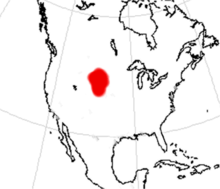Cynarctoides harlowi
| Cynarctoides harlowi Temporal range: Late Oligocene–Miocene | |
|---|---|
| Scientific classification | |
| Kingdom: | Animalia |
| Phylum: | Chordata |
| Class: | Mammalia |
| Order: | Carnivora |
| Family: | Canidae |
| Subfamily: | †Borophaginae |
| Tribe: | †Phlaocyonini |
| Genus: | †Cynarctoides |
| Species: | Cynarctoides harlowi |
 | |
| Range of Cynarctoides harlowi | |
Cynarctoides harlowi is an extinct species of Cynarctoides, belonging to the subfamily Borophaginae and tribe Phlaocyonini, a canid which inhabited west central North America during the Late Oligocene to Miocene epoch living 24.8—20.6 mya and existed for approximately 4.2 million years.
Taxonomy
Cynarctoides harlowi was originally named Pachycynodon harlowi by Loomis (1932). Its type locality is Van Tassel (Upper), which is in a Harrisonian terrestrial horizon in Wyoming. It was recombined as Nothocyon harlowi by Macdonald (1963); it was recombined as Cynarctoides harlowi by Xiaoming Wang, Richard H. Tedford et al. (1999).[1][2]
Morphology
Body mass
Two specimens were examined by Legendre and Roth for body mass.[3]
- Specimen 1 was estimated to weigh 1.21 kg (2.7 lb).
- Specimen 2 was estimated to weigh 1.28 kg (2.8 lb).
Fossil distribution
- Van Tassel, Niobrara County, Wyoming ~23.0—5.3 Ma.
References
- ↑ J. R. Macdonald. 1963. The Miocene faunas from the Wounded Knee area of western South Dakota. Bulletin of the American Museum of Natural History 125(3):139-238
- ↑ Phylogentic Systematic of the Borophanginae, X. Wang, R. Tedford, 1999 Archived March 20, 2007, at the Wayback Machine.
- ↑ S. Legendre and C. Roth. 1988. Correlation of carnassial tooth size and body weight in recent carnivores (Mammalia). Historical Biology
- Martin, L.D. 1989. Fossil history of the terrestrial carnivora. Pages 536 - 568 in J.L. Gittleman, editor. Carnivore Behavior, Ecology, and Evolution, Vol. 1. Comstock Publishing Associates: Ithaca.
- - PaleoDataBase - Cynarctoides harlowi
This article is issued from Wikipedia - version of the 12/4/2016. The text is available under the Creative Commons Attribution/Share Alike but additional terms may apply for the media files.